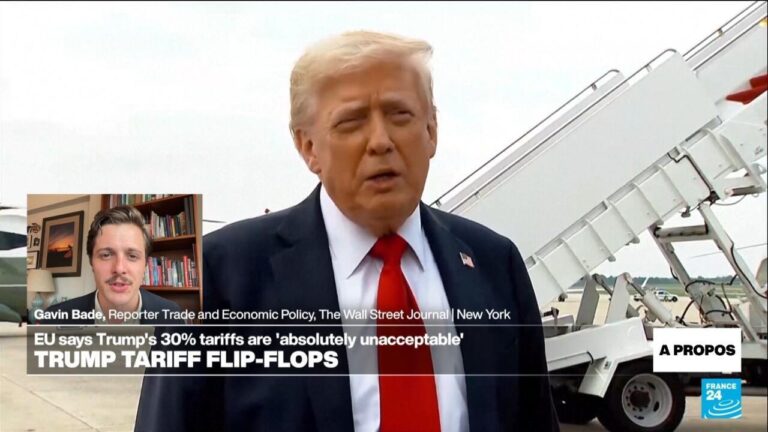In a move that could significantly reshape global trade dynamics, former U.S. President Donald Trump’s imposition of hefty tariffs on Brazilian goods is prompting Brazil to deepen its economic ties with China. As tensions escalate between Washington and BrasÃlia, analysts warn that the tariff measures may accelerate Brazil’s pivot towards its Asian trading partner, potentially altering longstanding alliances and impacting international markets. This development highlights the complex interplay of trade policies and geopolitical strategies in an increasingly multipolar world.
Trump’s Tariff Hikes Strain Brazil-US Trade Relations Impacting Key Sectors
The recent surge in tariffs imposed by the U.S. administration under President Trump has triggered significant economic ripples across Brazil’s export landscape. Key Brazilian industries such as agriculture, steel, and aerospace are facing heightened barriers that threaten their competitive edge in the American market. Brazilian exporters are grappling with increased costs and reduced demand, prompting many to re-evaluate their shipping destinations. This shift is not merely a fleeting disruption but a potential pivot away from a historically strong bilateral trade relationship.
In response to these escalating trade tensions, Brazil is accelerating its outreach to alternative global partners, with China emerging as a primary beneficiary. The South American powerhouse aims to solidify new trade agreements and deepen existing ones, seeking to offset the loss of U.S. market share. Key sectors adapting to this realignment include:
- Agricultural exports: Soybeans and meat products leading the redirection towards Asian markets.
- Manufacturing: Increasing collaboration in machinery and automotive parts with Chinese companies.
- Energy and mining: Enhanced Chinese investments in Brazilian infrastructure.
| Sector | Impact of Tariffs | Shift in Trade Focus |
|---|---|---|
| Agriculture | 15% tariff increase | Boost exports to China by 25% |
| Steel | 20% tariff imposition | Seek new clients in Asia and Europe |
| Aerospace | Restricted market access | Expand partnerships with Chinese firms |
Brazil Accelerates Economic Ties with China Amid Rising US Protectionism
In the wake of the recent tariffs imposed by the US administration targeting Brazilian exports, significant shifts in Brazil’s trade policies are underway. As American protectionism tightens, Brazil is pragmatically recalibrating its international alliances to safeguard economic growth. China, long recognized as a strategic partner, is now emerging as the primary beneficiary of this realignment. Brazilian officials have already initiated discussions to enhance bilateral agreements, focusing on sectors that promise mutual gains including agriculture, energy, and infrastructure.
Key areas driving Brazil-China cooperation include:
- Expanded soybean exports to meet China’s growing demand
- Investment in renewable energy projects across Brazil
- Joint ventures in technology and digital infrastructure
- Enhanced logistics and transportation networks linking the two economies
| Trade Partner | 2019 Exports (USD Billion) | Projected 2024 Exports (USD Billion) |
|---|---|---|
| United States | 30.2 | 24.5 |
| China | 43.7 | 58.9 |
Experts Advise Diversification and Strategic Partnerships to Mitigate Trade Risks
Amid growing uncertainties in global trade, industry specialists emphasize the significance of broadening market reach through diversification to counteract escalating risks. By reducing reliance on any single trade partner, countries like Brazil can cushion the impact of protectionist policies such as hefty tariffs. Experts argue that working with multiple international markets not only mitigates diplomatic and economic shocks but also strengthens supply chain resilience. This approach aligns with Brazil’s emerging tilt towards new partnerships, especially in Asia, as it seeks to balance trade flows disrupted by recent U.S. tariff hikes.
In addition to diversification, strategic collaborations hold a central role in navigating complex trade environments. Establishing joint ventures, free trade agreements, and sector-specific alliances enables stakeholders to share resources and expertise while tapping into new consumer bases. The table below outlines key benefits identified by analysts when forging such partnerships:
| Strategic Partnership Aspect | Potential Benefit |
|---|---|
| Market Access | Expanded export destinations |
| Technology Sharing | Improved production efficiency |
| Risk Distribution | Lower exposure to tariff shocks |
| Capital Investment | Boosted economic growth |
- Diversified trade portfolios reduce vulnerability to geopolitical tensions.
- Joint ventures offer avenues for technology and knowledge exchange.
- Multilateral agreements strengthen regional economic blocks.
Wrapping Up
As the United States enforces steep tariffs on Brazilian goods, the South American nation appears increasingly poised to deepen ties with China, its largest trading partner. This shifting dynamic underscores the broader realignment of global trade relationships amid rising protectionism. Observers will be closely watching how Brazil balances its economic interests between the world’s two largest powers in the months ahead.




